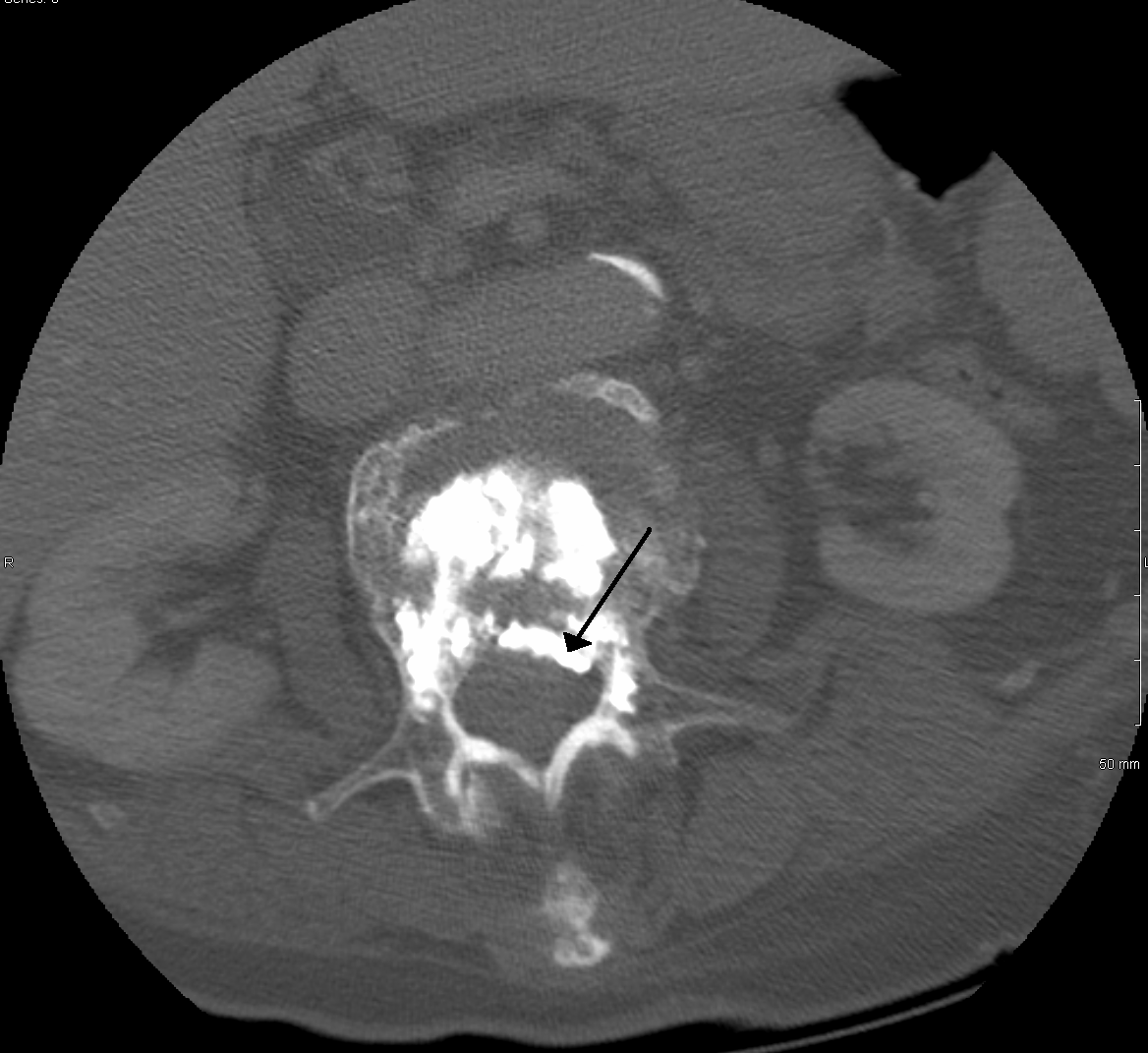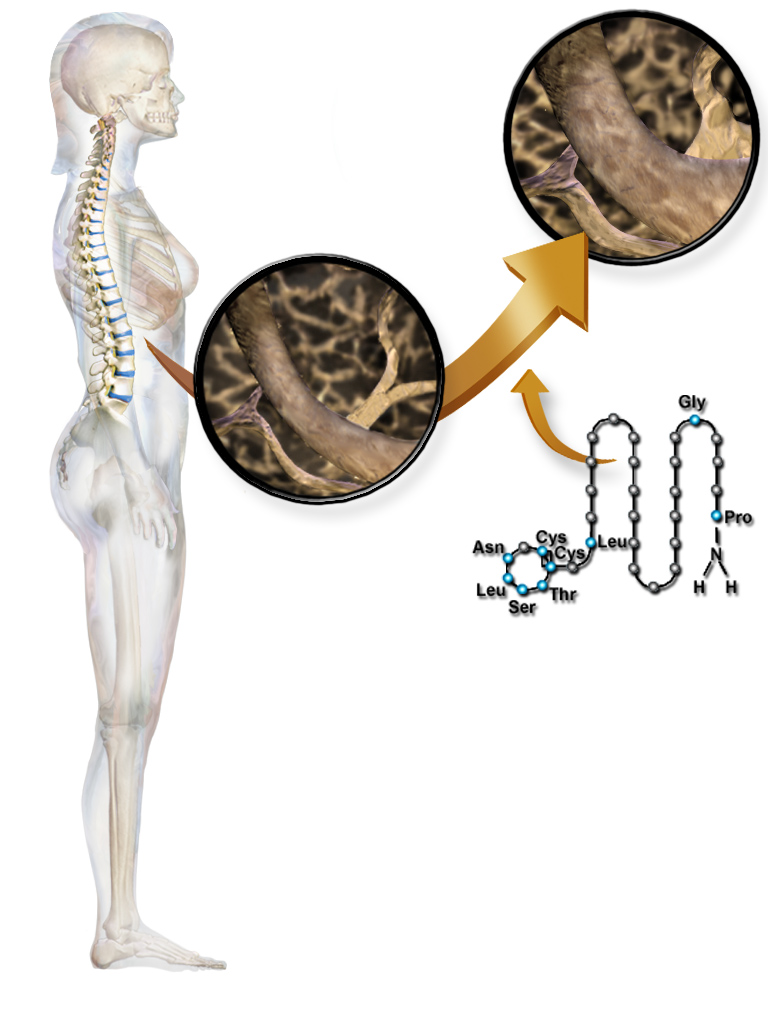|
Compression Fracture
A compression fracture is a collapse of a vertebra. It may be due to trauma or due to a weakening of the vertebra (compare with burst fracture). This weakening is seen in patients with osteoporosis or osteogenesis imperfecta, lytic lesions from metastatic or primary tumors, or infection. In healthy patients, it is most often seen in individuals suffering extreme vertical shocks, such as ejecting from an ejection seat. Seen in lateral views in plain x-ray films, compression fractures of the spine characteristically appear as ''wedge deformities'', with greater loss of height anteriorly than posteriorly and intact pedicles in the anteroposterior view. Signs and symptoms Acute fractures will cause severe back pain. Compression fractures which develop gradually, such as in osteoporosis, may initially not cause any symptoms, but will later often lead to back pain and loss of height. Diagnosis Compression fractures are usually diagnosed on spinal radiographs, where a wedge-shaped vert ... [...More Info...] [...Related Items...] OR: [Wikipedia] [Google] [Baidu] |
Vertebra
The spinal column, a defining synapomorphy shared by nearly all vertebrates,Hagfish are believed to have secondarily lost their spinal column is a moderately flexible series of vertebrae (singular vertebra), each constituting a characteristic irregular bone whose complex structure is composed primarily of bone, and secondarily of hyaline cartilage. They show variation in the proportion contributed by these two tissue types; such variations correlate on one hand with the cerebral/caudal rank (i.e., location within the backbone), and on the other with phylogenetic differences among the vertebrate taxa. The basic configuration of a vertebra varies, but the bone is its ''body'', with the central part of the body constituting the ''centrum''. The upper (closer to) and lower (further from), respectively, the cranium and its central nervous system surfaces of the vertebra body support attachment to the intervertebral discs. The posterior part of a vertebra forms a vertebral arch ... [...More Info...] [...Related Items...] OR: [Wikipedia] [Google] [Baidu] |
Bone Density Measurement
Bone density, or bone mineral density, is the amount of bone mineral in bone tissue. The concept is of mass of mineral per volume of bone (relating to density in the physics sense), although clinically it is measured by proxy according to optical density per square centimetre of bone surface upon imaging. Bone density measurement is used in clinical medicine as an indirect indicator of osteoporosis and fracture risk. It is measured by a procedure called densitometry, often performed in the radiology or nuclear medicine departments of hospitals or clinics. The measurement is painless and non-invasive and involves low radiation exposure. Measurements are most commonly made over the lumbar spine and over the upper part of the hip. The forearm may be scanned if the hip and lumbar spine are not accessible. There is a statistical association between poor bone density and higher probability of fracture. Fractures of the legs and pelvis due to falls are a significant public health problem ... [...More Info...] [...Related Items...] OR: [Wikipedia] [Google] [Baidu] |
Vertebroplasty
Vertebral augmentation, including vertebroplasty and kyphoplasty, refers to similar percutaneous spinal procedures in which bone cement is injected through a small hole in the skin into a fractured vertebra in order to relieve back pain caused by a vertebral compression fracture. After decades of medical research into the efficacy and safety of vertebral augmentation, there is still a lack of consensus regarding certain aspects of vertebroplasty and kyphoplasty. Procedure Vertebroplasty and kyphoplasty are the two most common procedures for spinal augmentation. These medical terms are classical compounds of the suffix '' -plasty'' meaning "molding or shaping surgically" (from Ancient Greek '' plastós'' "molded, formed") and the prefixes '' vertebro-'' "vertebra" (from Latin '' ''vertebra'' "joint, joint of the spine") and ''kypho-'' "humped; stooping forward" (from Ancient Greek '' kyphos'' "crooked"). Vertebroplasty Vertebroplasty is typically performed by a spine surgeon ... [...More Info...] [...Related Items...] OR: [Wikipedia] [Google] [Baidu] |
Kyphoplasty
Vertebral augmentation, including vertebroplasty and kyphoplasty, refers to similar percutaneous spinal procedures in which bone cement is injected through a small hole in the skin into a fractured vertebra in order to relieve back pain caused by a vertebral compression fracture. After decades of medical research into the efficacy and safety of vertebral augmentation, there is still a lack of consensus regarding certain aspects of vertebroplasty and kyphoplasty. Procedure Vertebroplasty and kyphoplasty are the two most common procedures for spinal augmentation. These medical terms are classical compounds of the suffix '' -plasty'' meaning "molding or shaping surgically" (from Ancient Greek '' plastós'' "molded, formed") and the prefixes '' vertebro-'' "vertebra" (from Latin '' ''vertebra'' "joint, joint of the spine") and ''kypho-'' "humped; stooping forward" (from Ancient Greek '' kyphos'' "crooked"). Vertebroplasty Vertebroplasty is typically performed by a spine surgeon ... [...More Info...] [...Related Items...] OR: [Wikipedia] [Google] [Baidu] |
Calcitonin
Calcitonin is a 32 amino acid peptide hormone secreted by parafollicular cells (also known as C cells) of the thyroid (or endostyle) in humans and other chordates. in the ultimopharyngeal body. It acts to reduce blood calcium (Ca2+), opposing the effects of parathyroid hormone (PTH). Its importance in humans has not been as well established as its importance in other animals, as its function is usually not significant in the regulation of normal calcium homeostasis. It belongs to the calcitonin-like protein family. Historically calcitonin has also been called thyrocalcitonin. Biosynthesis and regulation Calcitonin is formed by the proteolytic cleavage of a larger prepropeptide, which is the product of the CALC1 gene (). It is functionally an antagonist with PTH and Vitamin D3. The CALC1 gene belongs to a superfamily of related protein hormone precursors including islet amyloid precursor protein, calcitonin gene-related peptide, and the precursor of adrenomedullin. Secretion of ... [...More Info...] [...Related Items...] OR: [Wikipedia] [Google] [Baidu] |
Non-steroidal Anti-inflammatory Drug
Non-steroidal anti-inflammatory drugs (NSAID) are members of a therapeutic drug class which reduces pain, decreases inflammation, decreases fever, and prevents blood clots. Side effects depend on the specific drug, its dose and duration of use, but largely include an increased risk of gastrointestinal ulcers and bleeds, heart attack, and kidney disease. The term ''non-steroidal'', common from around 1960, distinguishes these drugs from corticosteroids, which during the 1950s had acquired a bad reputation due to overuse and side-effect problems after their initial introduction in 1948. NSAIDs work by inhibiting the activity of cyclooxygenase enzymes (the COX-1 and COX-2 isoenzymes). In cells, these enzymes are involved in the synthesis of key biological mediators, namely prostaglandins, which are involved in inflammation, and thromboxanes, which are involved in blood clotting. There are two general types of NSAIDs available: non-selective, and COX-2 selective. Most NSA ... [...More Info...] [...Related Items...] OR: [Wikipedia] [Google] [Baidu] |
Opioids
Opioids are substances that act on opioid receptors to produce morphine-like effects. Medically they are primarily used for pain relief, including anesthesia. Other medical uses include suppression of diarrhea, replacement therapy for opioid use disorder, reversing opioid overdose, and suppressing cough. Extremely potent opioids such as carfentanil are approved only for veterinary use. Opioids are also frequently used non-medically for their euphoric effects or to prevent withdrawal. Opioids can cause death and have been used for executions in the United States. Side effects of opioids may include itchiness, sedation, nausea, respiratory depression, constipation, and euphoria. Long-term use can cause tolerance, meaning that increased doses are required to achieve the same effect, and physical dependence, meaning that abruptly discontinuing the drug leads to unpleasant withdrawal symptoms. The euphoria attracts recreational use, and frequent, escalating recreational use of o ... [...More Info...] [...Related Items...] OR: [Wikipedia] [Google] [Baidu] |
Thoracic Lumbar Sacral Orthosis
A back brace is a device designed to limit the motion of the spine in cases of bone fracture or in post-operative spinal fusiona, as well as a preventative measure against some progressive conditions or to correct patient posture. Common back braces include: * Rigid (hard) braces : These braces are form-fitting plastic molds (historically leather) and rigid (typically metal) supports that significantly restrict motion by between 50 and 65% while rotation is limited by up to 70%. * Soft braces : Elastic braces that limit the forward motion of the spine and assist in setting spinal fusions or supporting the spine during occasions of stress (for example, employment requiring the lifting of heavy loads) * Semi rigid braces : Semi-rigid braces combine elements of flexible and rigid braces within one overall design. This is done by adding rigid supports or additional stiff padding and straps to the body of a flexible brace. Sometimes these added rigid supports are removable, allowing th ... [...More Info...] [...Related Items...] OR: [Wikipedia] [Google] [Baidu] |
Back Brace
A back brace is a device designed to limit the motion of the spine in cases of bone fracture or in post-operative spinal fusiona, as well as a preventative measure against some progressive conditions or to correct patient posture. Common back braces include: * Rigid (hard) braces : These braces are form-fitting plastic molds (historically leather) and rigid (typically metal) supports that significantly restrict motion by between 50 and 65% while rotation is limited by up to 70%. * Soft braces : Elastic braces that limit the forward motion of the spine and assist in setting spinal fusions or supporting the spine during occasions of stress (for example, employment requiring the lifting of heavy loads) * Semi rigid braces : Semi-rigid braces combine elements of flexible and rigid braces within one overall design. This is done by adding rigid supports or additional stiff padding and straps to the body of a flexible brace. Sometimes these added rigid supports are removable, allowing t ... [...More Info...] [...Related Items...] OR: [Wikipedia] [Google] [Baidu] |
Intravertebral Vacuum Cleft Sign
Avascular necrosis (AVN), also called osteonecrosis or bone infarction, is death of bone tissue due to interruption of the blood supply. Early on, there may be no symptoms. Gradually joint pain may develop which may limit the ability to move. Complications may include collapse of the bone or nearby joint surface. Risk factors include bone fractures, joint dislocations, alcoholism, and the use of high-dose steroids. The condition may also occur without any clear reason. The most commonly affected bone is the femur. Other relatively common sites include the upper arm bone, knee, shoulder, and ankle. Diagnosis is typically by medical imaging such as X-ray, CT scan, or MRI. Rarely biopsy may be used. Treatments may include medication, not walking on the affected leg, stretching, and surgery. Most of the time surgery is eventually required and may include core decompression, osteotomy, bone grafts, or joint replacement. About 15,000 cases occur per year in the United States. Peop ... [...More Info...] [...Related Items...] OR: [Wikipedia] [Google] [Baidu] |
X-ray Computed Tomography
An X-ray, or, much less commonly, X-radiation, is a penetrating form of high-energy electromagnetic radiation. Most X-rays have a wavelength ranging from 10 picometers to 10 nanometers, corresponding to frequencies in the range 30 petahertz to 30 exahertz ( to ) and energies in the range 145 eV to 124 keV. X-ray wavelengths are shorter than those of UV rays and typically longer than those of gamma rays. In many languages, X-radiation is referred to as Röntgen radiation, after the German scientist Wilhelm Conrad Röntgen, who discovered it on November 8, 1895. He named it ''X-radiation'' to signify an unknown type of radiation.Novelline, Robert (1997). ''Squire's Fundamentals of Radiology''. Harvard University Press. 5th edition. . Spellings of ''X-ray(s)'' in English include the variants ''x-ray(s)'', ''xray(s)'', and ''X ray(s)''. The most familiar use of X-rays is checking for fractures (broken bones), but X-rays are also used in other ways. Fo ... [...More Info...] [...Related Items...] OR: [Wikipedia] [Google] [Baidu] |
Spinal Radiograph
Medical imaging is the technique and process of imaging the interior of a body for clinical analysis and medical intervention, as well as visual representation of the function of some organs or tissues (physiology). Medical imaging seeks to reveal internal structures hidden by the skin and bones, as well as to diagnose and treat disease. Medical imaging also establishes a database of normal anatomy and physiology to make it possible to identify abnormalities. Although imaging of removed organs and tissues can be performed for medical reasons, such procedures are usually considered part of pathology instead of medical imaging. Measurement and recording techniques that are not primarily designed to produce images, such as electroencephalography (EEG), magnetoencephalography (MEG), electrocardiography (ECG), and others, represent other technologies that produce data susceptible to representation as a parameter graph versus time or maps that contain data about the measurement locat ... [...More Info...] [...Related Items...] OR: [Wikipedia] [Google] [Baidu] |











